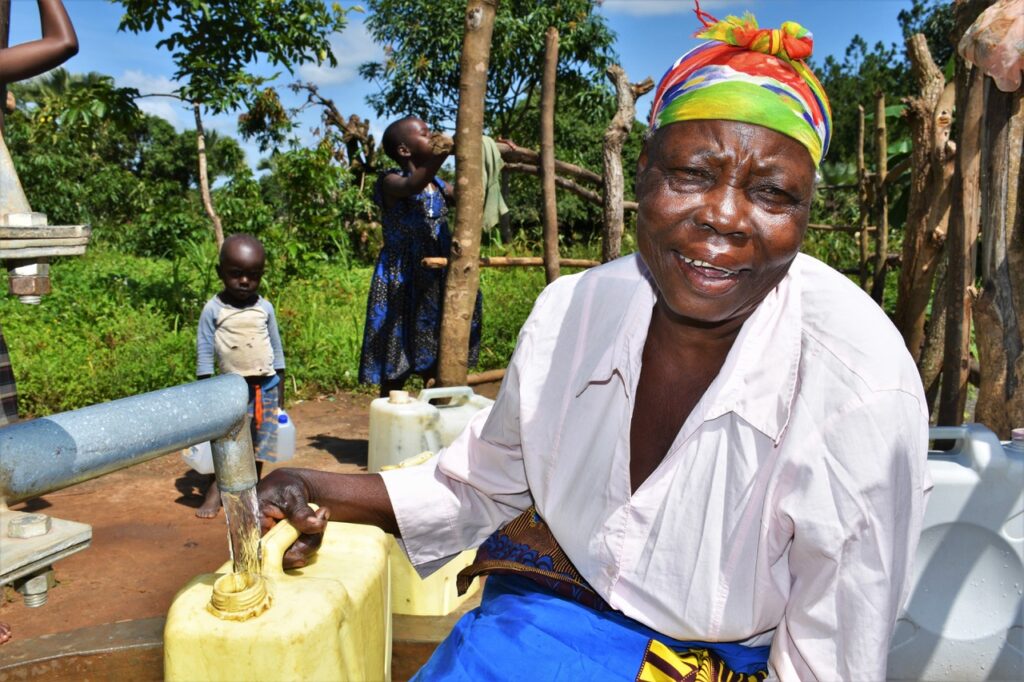How Access to Clean Water Transformed a Village

Laliya Dwol, a community of more than 400 households in the Gulu District of northern Uganda, is also home to one of the region’s top-performing secondary schools. In the school’s early days, the community enjoyed reliable access to clean water from a borehole drilled on the school grounds.
“The proprietor of the school had a borehole drilled on his land and generously allowed the community to use it,” explains Kilama Richard, the local land chief. As a result, families stopped collecting water from the two unprotected sources—Wang Lengo and Gang Lapena—which were known to be unsafe and often made people sick.
Water Access Slips Away from the Community in Laliya Dwol
Even after the school became fully operational, the community continued to rely on the well. “We no longer had to drink unsafe water. Our problems with dirty water were solved, and everyone was happy,” says Kilama. But as the school grew and enrollment increased, administrators decided to build a fence around the school for security reasons.
The pleaded with the school administration to consider putting the well outside the fenced in area so they could continue using it. “We tried, but our requests were denied”, Kilama recalls. Once the fencing was completed, community members were gradually discouraged from accessing the school compound. Students were prioritized at the borehole, and non-students were viewed as trespassers by school staff and guards.
Returning to Unsafe Water in Northern Uganda
With no other options, families were forced to return to unsafe water sources they had hoped to leave behind. “You have no idea how painful it is to go back to drinking dirty water after you’ve become accustomed to clean water,” says Kerudia Akidi, an elderly woman in the village. She had previously fetched water herself but now had to rely on her grandchildren to collect water from distant waterholes. “It’s far, so I often send the kids. But they come back with dirty water—sometimes with mucus in it,” she laments.
A New Water Well Brings Hope Back to Laliya Dwol
Despite repeated requests, the community was unable to secure a new borehole—until Drop in the Bucket stepped in. As part of our mission to provide clean water to communities in sub-Saharan Africa, we identified Laliya Dwol as a priority area.
“Now we have our own borehole,” says Kilama. “To show how much we needed this, we offered land for the well and even tore down a nearby latrine to make sure there was no risk of contamination”
Celebrating a Sustainable Clean Water Solution
At the commissioning of the new Uganda water well, local leaders joined the community in celebration. “This is a great replacement for what you lost,” said Wilson, a local council leader. “It goes without saying that you’ll take good care of it.”
Deputy Mayor Alworo Prossy Ibona, who also serves as the secretary for community-based services, echoed the gratitude: “Our division headquarters does not have the funds to drill boreholes. Thank you so much for this donation.”
Speaking on behalf of the women in the village, Kerudia Akidi added, “We are so thankful. I wish you could drill more—some for the neighboring villages—but we’ll share this one with the community to the north that still doesn’t have access to clean water.”
A Water Organization Creating Lasting Impact in Africa
At Drop in the Bucket, we know that access to clean water transforms lives. Our work as a clean water charity goes beyond drilling wells—we focus on sustainability, community ownership, and long-term health. Laliya Dwol is just one example of how the right support can restore dignity, health, and opportunity to a community in need.
Want to support water wells for schools and villages in Uganda? Donate now and help us bring clean water to more communities across sub-Saharan Africa.
